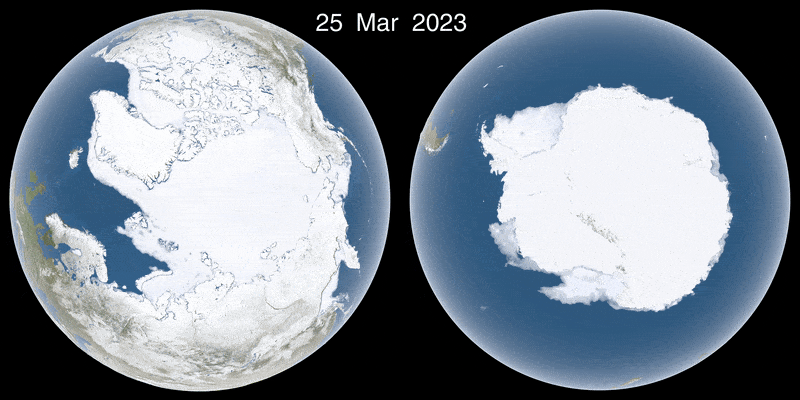Last weekend, on March 22, the Arctic Sea reached its maximum coverage of ice for the winter season and it is the lowest since satellite records began 47 years ago. The sea ice covered 14.33 million square kilometers (5.53 million square miles), about 1.3 million square kilometers (506,000 square miles) below the 1981-2010 average. That is an area of ice bigger than South Africa’s worth of ice that has vanished due to the climate crisis.
ADVERTISEMENT
The analysis comes from the National Snow and Ice Data Center, part of the University of Colorado Boulder. Though the researchers have stressed that changes in weather and late-season growth might affect the final numbers and the full analysis will be published in a few weeks, it seems clear that the data is extremely worrying.
The previous lowest maximums have all occurred in the last decade, in 2017, 2018, 2016, and 2015, respectively. This year is 80,000 square kilometers (31,000 square miles) lower than in 2017; that’s a reduction the size of South Carolina. The actual day of the maximum also happened 10 days later than the average data shows it occurred between 1981 and 2010. The date of the maximum is quite variable being as early as February 24 in 1987 and 1996 and as late as April 2 in 2010.

Ice cover ebbing and flowing throughout the year in the Arctic (left) and Antarctic (right).
Image credit: Trent Schindler/NASA’s Scientific Visualization Studio
Temperature in the Arctic was 1 to 2 °C (1.8 to 3.6 °F) above average in the region and the surrounding seas. The Bering Sea was low for much of the season so it was its growth during March, close to average conditions, that became a primary contributor to the total Arctic sea ice extent.
The dramatic diminishing of the Arctic winter ice is the latest data revealing the extraordinary global conditions we are living in. 2024 was the hottest year on record, with the previous top 10 record holders all being in the last decade, and this trend is already continuing this year, with January 2025 being the hottest January on record.
In his New Year message, UN Secretary-General António Guterres called for greater action against the climate crisis as more dramatic changes loom and we face extreme weather events more often and of greater power.
“This is climate breakdown – in real-time. We must exit this road to ruin – and we have no time to lose. In 2025, countries must put the world on a safer path by dramatically slashing, and supporting the transition to a renewable future. It is essential – and it is possible,” Guterres stated in his message.
ADVERTISEMENT
The situation remains serious but climate actions will go a long way to mitigate the worst effects. The best day to push politicians and governments to do more is today.
Source Link: Arctic Sea Ice Winter Maximum At Lowest Level Since Records Began 47 Years Ago